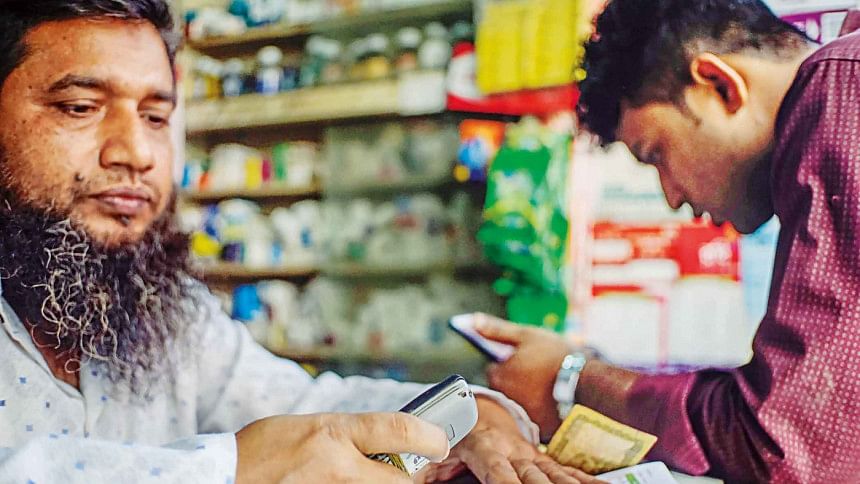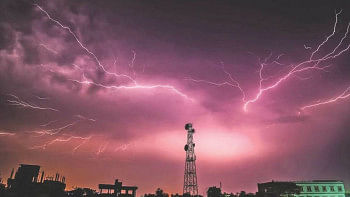Mobile money in the COVID-19 pandemic

The most defining perk of using Mobile Financial Services (MFS) is being able to use mobile phones to access financial services and execute financial transactions. Put simply, cashless payment makes life easier.
Sagufta Nusrat, an executive of a Dhaka-based private company, is a customer of the country's leading MFS provider bKash.
In the morning, Nusrat takes an Uber to go to office and pays the bill through her digital wallet. And in the evening, when she returns home from office, she purchases groceries from superstores and makes the payments from her bKash account.
Not only that, she pays her monthly utility bills—gas, water and electricity—DTH bill, internet bill, mobile top-up, and her sister's university tuition fees through the app.
"On top of it all, it helps me keep track of the money I spend and it makes my money management stress-free," Nusrat told The Daily Star.
"I have been using MFS for a few years now but since coronavirus was detected in the country, the usage of MFS has increased as I am much more reluctant to come into contact with physical money now," she explained.
Like Nusrat, a big chunk of the country's population uses the services of MFS providers who have seen a turbocharged growth since the service was introduced a decade ago.
Amidst the new challenges brought on by Covid-19, people are now increasingly depending on digital solutions to adapt to the new normal, looking for simple-to-use services at one place to meet essential needs ensuring personal safety.
The new normal has accelerated digital transactions and financial inclusion, strengthening the foundation of digital financial services all over the world.
And since Covid-19 emerged, MFS providers witnessed a tremendous surge in the number of customers as it added around 1.5 crore clients in nine months (March to November) last year, taking the number of registered clients now to 9.64 crore.
True to the notion that MFS is a bank in the pocket, customers can keep money in their mobile wallet and send money from the wallet to a bank account. 22 banks have been integrated into the Add Money network of bKash, 3 banks to the fastest growing MFS Nagad and customers of different platforms can also add money to their accounts from Visa and Mastercard.
Monthly transactions through MFS rose by a staggering Tk 12,264 crore to Tk 53,598 crore in November last year when compared with transactions in February.
During the pandemic, utility bill payments nearly doubled to Tk 831.43 crore in November last year, up from Tk 441.12 crore in February of that year. The merchant payments more than tripled from Tk 581 crore in February to Tk 1,879 crore in November last year.
The government provided cash assistance to 50 lakh poor families hit by the coronavirus pandemic through four major MFS operators.
Bringing innovation and technological integration to the table, the country's 15 MFS operators are now also providing services like sending money, cash-in, cash-out, salary disbursement, donation for the poor, stipend disbursement, remittance, payments for different government services, toll payment, credit card bill payment, insurance premiums, etc.
Launched in 2011, the leading MFS operator bKash operates as a payment service provider that offers a broad range of digital financial services. During the ongoing pandemic, it added around 1 crore new customers, bringing its total client base to 5 crore with 2.4 lakh agents. Its current daily transaction is over a whopping Tk 1,000 crore.
Nagad, the mobile financial arm of the postal department, added over 70 lakh new customers during the pandemic taking the number of its customers to over 2.5 crore – making it the fastest-growing MFS provider in the country. Launched in 2019, Nagad now has 1.78 lakh agents and its daily transaction is now over Tk 200 crore.
In what is a major success for an emerging platform, Nagad is now distributing the government's stipends and allowances among 1.3 crore primary school students.
The third largest and a pioneering MFS provider in the country, Rocket, added 30 lakh customers during the pandemic taking its number of customers to 2.19 crore. Launched in the first quarter of 2011, its current daily transaction reached Tk 410 crore.
Although Bangladesh has made tremendous progress in the MFS sector, extravagant charges are the major impediment for greater financial inclusion, according to experts.
Users and consumers' rights groups have urged the government, at different times, to bring down the cash-out charges for mobile banking to a single digit.
Nagad, the financial service arm of the postal department, has brought down the cash-out charge to Tk 11.49 per Tk 1,000 withdrawal whereas it was Tk 18.5 when the MFS industry had just come into being in Bangladesh a decade ago.
"Since launching the cheapest cash withdrawal charge, Nagad's transactions increased significantly and it is drawing in new customers," said Tanvir A Mishuk, managing director of Nagad.
"It also prompts financial inclusion thanks to the government," he added.
Sabbir Ahmed, a resident of the capital's Dhanmondi area, said he prefers using Nagad because of low cash-out charge.
However, the customers of Rocket, who withdraw money from the MFS provider's owning entity Dutch-Bangla Bank's booths, enjoy the cheapest cash-out rate of Tk 9 for per Tk 1,000 withdrawal.
And everyday Rocket customers cash out Tk 150 crore using the bank's 5,000 booths spread across the country, from the cities to the villages.
"We have no problem with reducing transaction charges. But, every player has to reach a consensus on it," said Abul Kashem Md Shirin, CEO of the bank.
"The regulator can play a role and instruct the service providers how they should charge."
According to industry insiders, MFS in Bangladesh have still not been able to accelerate digital payments as China and India have.
bKash has 1.6 lakh merchant points and Nagad has 11,000 merchants, giving the customers a very small window to make digital payments.
Bangladesh also lags behind in providing loans through MFS providers; the model is immensely popular in neighbouring India, and especially in China.
In China, around 100 banks, ranging from national lenders to small rural banks, signed up for the opportunity to expand their balance sheet by partnering with financial technology giant Ant, which is now under the scrutiny of the Chinese government.
At the end of June 2020, Chinese banks and trust companies had the equivalent of around USD 230 billion in outstanding loans to consumers who borrowed through Alipay which Ant owns, the Wall Street Journal estimates.
As the Bangladesh Bank has warmed up to the idea as it stands to accelerate financial inclusion in the country, City Bank and bKash have announced rolling out digital lending on a pilot basis in July.
A select group of bKash users will now be able to get a loan of up to Tk 10,000 collateral-free instantaneously.
"We have witnessed tremendous success in the pilot project. We are planning to launch the service commercially soon," said Mashrur Arefin, CEO of City Bank, which has Citytouch, a digital banking service offering a simple way of doing banking from anywhere round the clock.
In the pilot project, there were 17-18 thousand customers who got loans of Tk 2 crore. The default rate was less than 1 per cent for the project loan whereas the bank's default rate is 4.5 per cent.
"It will be a game-changer and the future of digital lending is bright because using this service people will be able to get small loans and the default rate is much lower than corporate loans," added Arefin.
"This is high time for Bangladesh Bank to give permission to MFS for providing small loans," Mustafa Jabbar, posts and telecom minister, told The Daily Star.
"As MFS have brought unbanked people into its orbit, such loans will help villagers take up small ventures and eventually the country's economy will be booming," he added.
Mishuk of Nagad said his company is fully prepared to provide loans to its customers.
Another major impediment for financial inclusion is fraudulent activities using MFS.
The Counter Terrorism and Transnational Crime (CTTC) unit of Dhaka Metropolitan Police has received over 700 MFS crime allegations.
"Mobile financing is being used in almost 20 types of criminal activities such as drug trafficking, human trafficking, smuggling, kidnapping and online fraud," said an official of the CTTC.
Shamsuddin Haider Dalim, head of corporate communication of bKash, said, "Our customers are currently executing around 8 million transactions daily through our platform with full confidence and trust.
"Yet, very few fraudulent incidents occur given our nationwide awareness campaigns. Throughout the year, bKash tries to raise awareness about security among customers. For example, the importance of not sharing one's PIN or OTP code," he added.

 For all latest news, follow The Daily Star's Google News channel.
For all latest news, follow The Daily Star's Google News channel. 



Comments